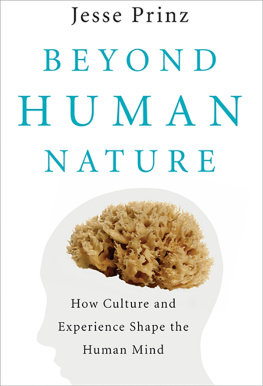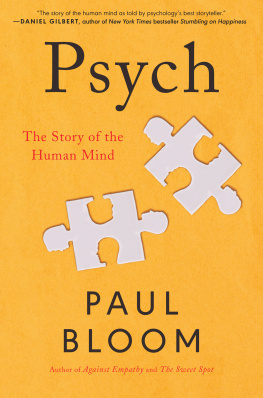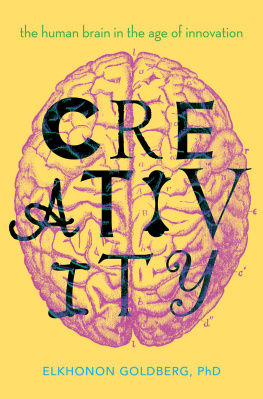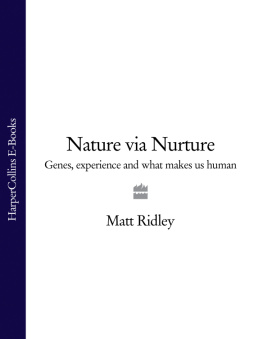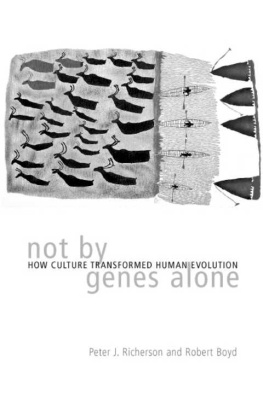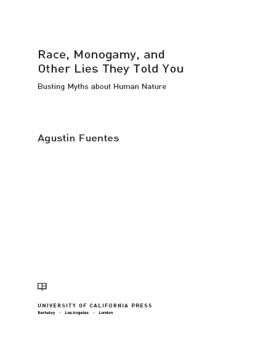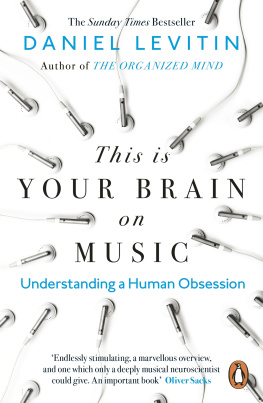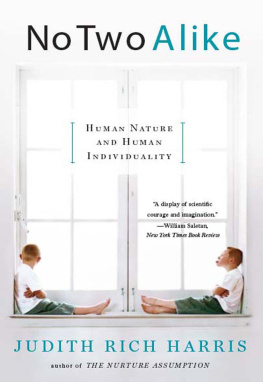
Beyond Human Nature
How Culture and Experience
Shape the Human Mind
JESSE J. PRINZ

W. W. Norton & Company
New York London
For my brother, Tommy Dog
Try this simple experiment. Go into a crowded cafeteria and look at what people are wearing. See if you can find two people wearing exactly the same thing. Count the number of styles you see: corporate types in suits, preppies in polos, academics in tweed, metrosexuals in black, hipsters in tight jeans, old men in cardigans, jocks in jerseys. No two people will have the same shirts or shoes, and if they did, that would be embarrassing. If you are feeling gregarious, start talking to people. Determine whether any two people share all the same opinions, interests and pastimes. Some are liberal, some are conservative; some are religious, some are atheists; some like water-sports and read crime novels; some like swing dancing and read Jane Austen; just about everyone has a different job description. Now ask people about their food preferences, their favourite movies and, if you dare, their sexual fantasies.
When you carry out this exercise, you will find dazzling diversity. There will be plenty of overlap, of course, but the range of human variation at a single cafeteria would make a troupe of chimpanzees look as undifferentiated as a school of minnows. If we look beyond the local cafeteria and explore gathering places in different cultures, the variation is absolutely staggering. There are profound differences in dress, beliefs, thinking styles and values. Some people think without numbers, some feel things we never feel, and some have even tasted human flesh.
Variation is not random. Each of us is the product of multiple influences. Our biographies, religious affiliations, material resources and geography all contribute in systematic ways. If you meet a stranger on a train and want to guess her political orientation, you might ask her where she lives, how much money her household earns and how often she goes to church. With just a few demographic facts, youd probably make a pretty accurate guess. And if you want to know why a particular demographic subculture has the values it does, you can often gain insight by looking into history. There are reasons why some people are conservative and others are liberal. There are also reasons why some people are cannibals and some are kosher.
SHIFTING FOCUS
Until recently, cognitive scientists have neglected cultural differences. The term cognitive science refers to the collection of academic disciplines that try to collectively investigate how the mind works. When the term was officially adopted in the mid 1970s, six disciplines were included: anthropology, computer science, linguistics, neuroscience, philosophy and psychology. Since the inception, however, anthropology has hardly played any role. Anthropologists rarely incorporate discoveries about the way the mind works in their research, and those who study mental processes rarely apply their techniques to members of different cultural groups. Linguists ignore the languages of other cultures because they erroneously assume that language has no influence on thought. Psychologists do all their experiments on university students and assume that they can extrapolate from this select group to all other minds around the globe. Neuroscientists rarely attempt to study brain activity in members of different cultures; they assume that all brains function in the same way, despite overwhelming evidence that much of the brain is not pre-wired.
By ignoring cultural variation, researchers end up giving us a misleading picture of the mind. We end up with the idea that psychology is profoundly inflexible. This outlook grossly underestimates human potential. It leads to the view that our behaviour is mostly driven by biology. Mainstream cognitive scientists give the impression that human traits are innate, genetic or hardwired.
I will refer to researchers who emphasize biological causes of behaviour as naturists, because they place their bets on the nature side of the naturenurture debate. Numerous books and articles have been Human courtship has been explained in evolutionary terms, political preferences have been explained by genetic inheritance, and depression is chalked up to a chemical imbalance in the brain. These explanations miss the obvious fact that courtship, politics, and psychiatric maladies vary across cultural boundaries. Myopic focus on our own cultural group has promoted an undue faith in biological determinants of behaviour.
The chapters ahead are intended as a corrective. To counterbalance the current trend of evolutionary and genetic explanation, I will explore the exciting new frontier of cultural psychology. Breaking away from the orthodoxy, some researches have been investigating the psychological impact of cultural differences. The results of these investigations are fascinating. Consider:
People raised in Western countries tend to see the trees before the forest, while people from the Far East see the forest before the trees.
In south-east Asia, there is a common form of mental illness, unheard of here, in which people go into a trancelike state after being startled.
Compared with Northerners, people in the American South are more than twice as likely to kill someone over an argument.
Research on cultural variation is leading to a new understanding of how the mind works. Until recently, psychologists frequently claimed that the mind is heavily constrained by innate biological mechanisms. Now, we are beginning to realize that the mind is far more malleable than we had appreciated. Again, consider:
Your colour vocabulary can affect how similar two hues appear.
Large IQ gaps between two people can be cut in half after four years of college.
If you have an identical twin, there is a 50 per cent chance that you will have significantly different personalities.
The widespread differences in perception, intelligence and temperament can often be traced to cultural, rather than biological, causes. Such discoveries illustrate a new appreciation of global variation within the social sciences, and a new understanding of disparities here at home. The way we think not just what we think about depends on experience and socialization.
This perspective can be called nurturism. Nurturists agree with naturists that biology matters. If we want to understand human behaviour, it is important to remember that human capacities and motivations are biologically constrained. But, when we focus on those biological constraints, we miss out on the headline news. What makes our species most interesting is that we exhibit astonishing variation. We are the only creatures on the planet that can radically alter their biological programmes. Nurturists emphasize flexibility, while naturists emphasize fixity.
Naturism is not just misleading; it is potentially dangerous. It has been used to keep various groups down, and it vastly underestimates human potential. When we assume that human nature is biologically fixed, we tend to regard people with different attitudes and capacities as inalterably different. We also tend to treat differences as pathologies. We regard people who think differently than we do as defective. We marginalize groups within our borders and we regard the behaviour of foreigners as unnatural or even subhuman.
Of course, most of the scientists who defend naturism do not have malevolent intentions, and they resent the fact that biological explanations of behaviour have been labelled politically incorrect. Naturists have to endure venomous attacks from left-wing groups that regard their programme as intrinsically racist or sexist. In response to these charges, naturists argue that political values should not forestall scientific inquiry. If behaviour is strongly influenced by biology, those influences must be scientifically investigated even if they make us uncomfortable and even if some people will use science to promote vicious ends. Moreover, nurturism can be every bit as dangerous as naturism. If we assume that all undesirable behaviour is the result of bad rearing, for example, we may blame the wrong people and miss out on opportunities for intervention. If we assume that human beings are infinitely flexible, we might initiate social programmes that are doomed to fail.
Next page
